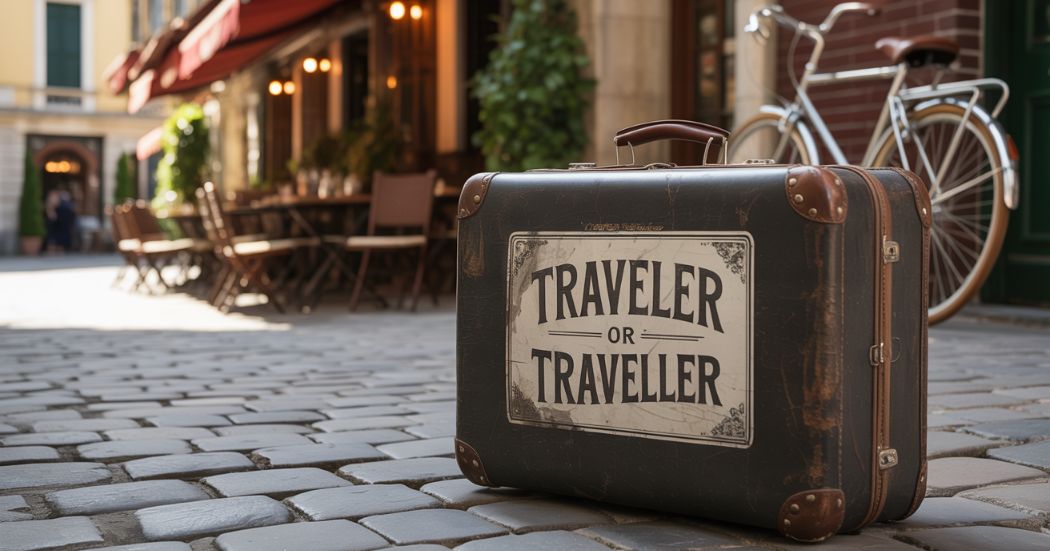The English language is filled with words that look almost identical but vary subtly in spelling, depending on where and how they’re used. One of the most commonly confused examples is the word “traveler” vs. “traveller.” At first glance, it seems like a simple case of an extra “l”, but the distinction carries regional, cultural, and stylistic significance.
If you’ve ever been puzzled by which form to use, you’re not alone. Let’s explore the origins, usage, and proper contexts for these two spellings—with real-life examples to illustrate each.
The Core Difference: American vs. British English
Spelling Variations Between Regions
The primary difference between “traveler” and “traveller” lies in regional spelling conventions. In short:
- Traveler (with one “l”) is the American English spelling.
- Traveller (with two “l”s) is the British English spelling.
This variation aligns with other similar differences, like:
- Color (US) vs. Colour (UK)
- Center (US) vs. Centre (UK)
- Canceled (US) vs. Cancelled (UK)
In most cases, the rules are consistent. American English favors simplification—dropping double consonants in many words—while British English retains more traditional spellings, often derived from Latin or French.
Real-Life Scenarios: How Spelling Impacts Usage
Scenario 1: A Blog Written by a U.S. Backpacker
Imagine you’re reading a travel blog by Sarah, a digital nomad from California.
“As a traveler, I always carry a journal to document each city I explore. Whether I’m hiking in Peru or café-hopping in Paris, I make sure to write every night.”
In this case, Sarah uses “traveler” because she’s writing in American English. If she were submitting an article to a U.K.-based magazine, an editor might change the spelling to “traveller” for consistency.
Scenario 2: A London-Based Travel Agency’s Website
Now picture a brochure from a company in London promoting tours across Europe:
“Every traveller deserves comfort and style. That’s why we offer luxury coaches, gourmet meals, and exclusive access to historical landmarks.”
Here, “traveller” is the standard, because it aligns with British English conventions. Readers in the U.K. expect to see words spelled in this way, and using “traveler” might even seem jarring to them.
Why This Matters in Professional Writing
Consistency Is Key
Whether you’re writing a blog, a business proposal, or marketing materials, consistent spelling matters. If your content switches back and forth between “traveler” and “traveller,” it may look unprofessional or cause readers to pause unnecessarily.
- If your audience is primarily in the U.S., stick with traveler.
- If your readers are based in the U.K., Canada, Australia, or New Zealand, use traveller.
Example: International Travel Magazine
A global travel magazine might adopt British English as the default, due to its broader international usage. In this case:
“Each month, we spotlight a unique journey taken by a seasoned traveller. From camel treks across the Sahara to train rides through the Swiss Alps, our stories celebrate the spirit of exploration.”
Even if the author is American, their submission would be edited to reflect the magazine’s house style.
Other Word Forms: Travelling vs. Traveling
The spelling difference doesn’t stop with just the noun. Related words also change:
| American English | British English |
|---|---|
| Traveler | Traveller |
| Traveling | Travelling |
| Traveled | Travelled |
| Travelog | Travelogue |
So, an American might write:
“I’ve traveled across five countries this year.”
While a Brit would say:
“I’ve travelled across five countries this year.”
Keeping this in mind helps ensure your writing feels authentic to your audience’s expectations.
Common Mistakes and How to Avoid Them
Mistake 1: Mixing Spellings in the Same Document
Using “traveler” in one sentence and “traveller” in the next can be distracting and confusing. This usually happens when writers rely on autocorrect or paste content from multiple sources.
Tip: Use your word processor’s language setting to define English (US) or English (UK) before you begin writing.
Mistake 2: Using the Wrong Form for a Job Application or Resume
If you’re applying for a position abroad say, in London and you list your experience like this:
“Experienced traveler who has organized group tours across Europe.”
It may not disqualify you, but it could appear less polished. Using “traveller” in this context shows attention to detail and respect for local norms.
Mistake 3: Letting Software Decide
Auto-correction tools like Grammarly or Word’s spelling checker often default to American English unless you tell them otherwise. If you’re writing for a global audience, double-check your settings.
Tips for Writers, Bloggers, and Marketers
- Know your audience. Are your readers based in Texas or in London? Tailor your spelling accordingly.
- Set a style guide. If you’re part of a team, create a shared document that defines whether you use American or British English across all content.
- Use consistent spelling for SEO. If you’re targeting U.S. travelers, optimize for “traveling tips” rather than “travelling tips.”
The Broader Context: What It Says About You
Language is more than just grammar—it’s identity, tone, and audience connection. Using the right spelling form of traveler/traveller does more than just tick a correctness box. It says:
- You understand your readers.
- You care about regional nuances.
- You’re a thoughtful, detail-oriented communicator.
Final Thoughts
Ultimately, both “traveler” and “traveller” are correct spellings, but context determines which one is appropriate. It’s a subtle difference that can have a noticeable impact, especially in professional or published writing.
So, the next time you’re writing about a journey be it real or imagined take a moment to consider where your words are going, just like a traveler would consider where their next flight might take them.
Whether you’re a seasoned traveller or a first-time traveler, words matter. And choosing the right ones can make all the difference in how your message is received.


